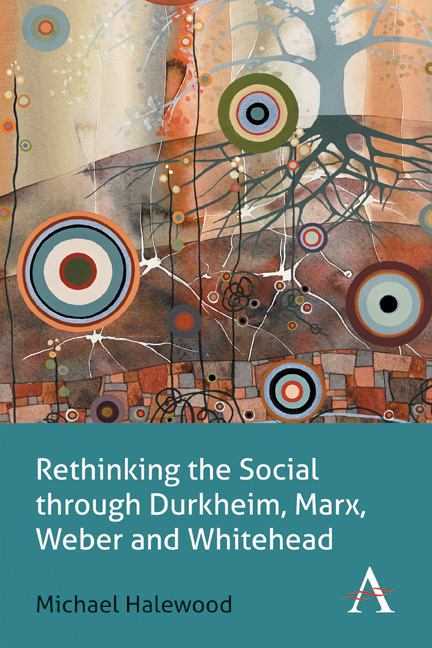Book contents
- Frontmatter
- CONTENTS
- Acknowledgements
- List of Abbreviations
- Chapter One Rethinking the Social
- Chapter Two Durkheim Approaches the Social
- Chapter Three Durkheim's Philosophy of the Social
- Chapter Four Marx on the Social and the Societal
- Chapter Five Weber's “Sozial” Action
- Chapter Six The Early Death of the Problem of the Social
- Chapter Seven Toward a Philosophy of the Social – Part One: Durkheim, Marx, Weber (and Simmel) Revisited
- Chapter Eight Toward a Philosophy of the Social – Part Two: Whitehead on Sociology, Societies and the Social
- Notes
- References
- Index
Chapter Three - Durkheim's Philosophy of the Social
Published online by Cambridge University Press: 05 December 2015
- Frontmatter
- CONTENTS
- Acknowledgements
- List of Abbreviations
- Chapter One Rethinking the Social
- Chapter Two Durkheim Approaches the Social
- Chapter Three Durkheim's Philosophy of the Social
- Chapter Four Marx on the Social and the Societal
- Chapter Five Weber's “Sozial” Action
- Chapter Six The Early Death of the Problem of the Social
- Chapter Seven Toward a Philosophy of the Social – Part One: Durkheim, Marx, Weber (and Simmel) Revisited
- Chapter Eight Toward a Philosophy of the Social – Part Two: Whitehead on Sociology, Societies and the Social
- Notes
- References
- Index
Summary
A Question of Association
The previous chapter concluded that Durkheim's use of the term “society” is problematic, but it is not possible to ignore its role within his work. Therefore, his usages of the word should be taken with a pinch of salt. In so far as it is possible to make such a claim, Durkheim is clear that societies are defined by their combination. “We have just seen that societies are only different combinations of one and the same original society” (RSM, 116). It is the manner of this combination which makes a society what it is, exhibits what is specific about it, enables it to arise and endure, and also constitutes it as an object for sociology. Such combinations, such different forms of combination, are made up of what Durkheim calls “associations”. This is a neglected term in analyses of Durkheim's texts, though it should be stressed at the outset that it has interesting resonances with Latour's (2005) more recent proposal of a “sociology of associations” or “associology” (Latour 2005, 9). Durkheim has a very specific sense of “association” which is evident from his earliest texts onwards. More than that, it is closely tied to the notion of obligation. Hence: “the fact of association is the most obligatory of all, because it is the origin of all other obligations. By reason of my birth, I am obligatorily attached to a given people” (RSM, 130). This provides a fuller understanding of obligation; it is not the foundational element of collectivity, for it is the “origin of all other obligations”. Association, in this example, refers to the links or ties of one person to another, such as in terms of family or nationhood. Again it points to the notion of sociability in terms of the ability to be social. Such an approach might seem to suggest that association is something which only happens at the human level.
- Type
- Chapter
- Information
- Publisher: Anthem PressPrint publication year: 2014

